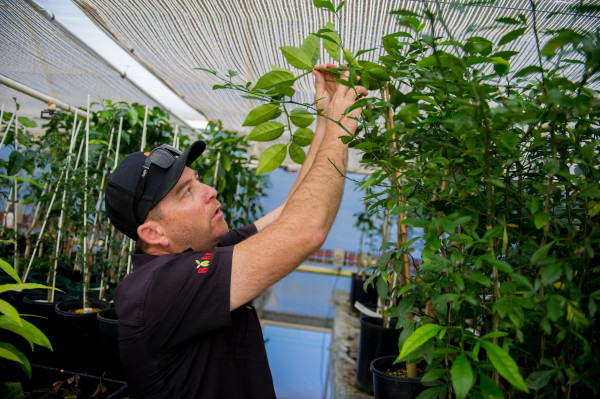A PRIVATE orchard in Red Cliffs is vying to introduce a new variety of seedless lemon and seedless late-season mandarin trees to the market.
Business partners Jason Bowes and Sean Arkinstall from Victorian Citrus Farms and Bark Orchards have spent the past decade trying to alter the genetic make-up of previously seeded fruit through the process of gamma irradiation.
Mr Bowes said he selects public varieties of fruit with good attributes, that are otherwise let down by having seeds in them.
He then sends the tree’s budsticks to the Australian Nuclear Science and Technology Organisation.
“ANSTO then irradiate them, or applies the radiation in Gy, in Grey units,” Mr Bowes said.
“What that irradiation does, and it depends on the rate that you do, it can mutate cells in that particular budstick.
“It can make it earlier (in the season), it can make it later, it can reduce seeds, it can create more seed.
“There’s a lot of different ways that it can mutate but my aim is to reduce the seed in that particular public variety that was seeded and turn it into a seedless variety, and I’ve been successful twice in doing it.”
The pair have put about 20 varieties of fruit through the irradiation process multiple times, with mixed success.
“Once the irradiation is applied, I then bring that particular stick or that variety, and I graft the bud onto a rootstock,” Mr Bowes said.
“These trees have been here (in a greenhouse) for four years, then I put them in the field for three years – it takes three years to get a piece of fruit – and then what I do is I then start cutting fruit open to see if there’s been a mutation.”
Mr Bowes said if a grower is fortunate enough to form a seedless tree variety through this process, they then have to gain plant breeder’s rights to bring it to the retail market.
“For instance the lemon that I found, I’ve got to gather other varieties with similarities and parentage, and a PBR officer has to prove that it’s different to the original,” he said.
He said if plant breeder’s rights are granted, the final hurdle if generating public interest in the plant and getting growers to come on board commercially.
“You’ve got options to grow under licensed agreements in Australia and overseas,” Mr Bowes said.
“If you do find the right variety with the right timing that fits a particular window for the right market, it’s like winning the lotto.”
















